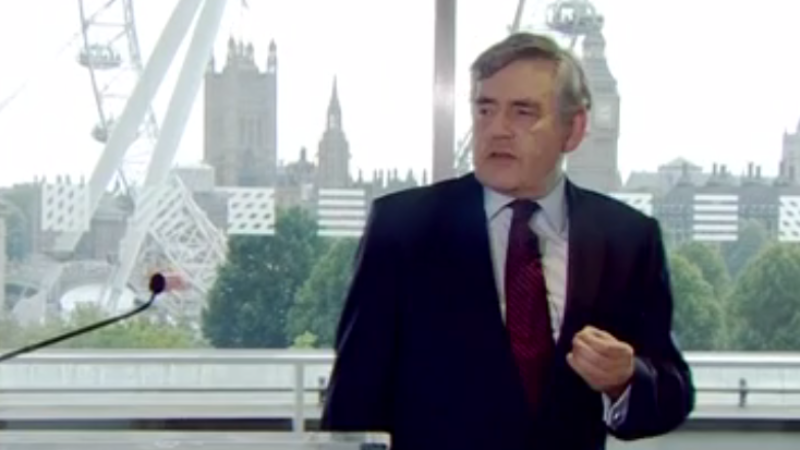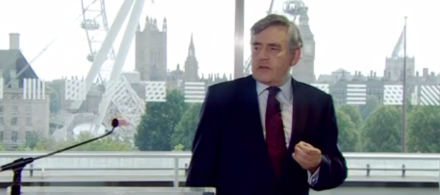

In some ways, Gordon Brown’s speech today made sense. In other ways, it didn’t. But most of all, it scared the hell out of me.
Brown argued that power for its own sake was wrong, that there needed to be a driving purpose propelling the desire to govern. He said that the “mission” of the Labour Party is simple: “to build a socially just Britain where there is at least equality of opportunity and fairness of outcomes”. This mission statement is roughly correct for the party, and while it may be vague, it is specific in one important aspect.
To build.
Not to support. Not to hope. Not to vote for, demand, or protest in favour of. To build.
And you cannot build a new Jerusalem in England (or Britain, as Brown revealed John Smith used to sing) from the opposition benches:
“Never forget that our obligation is to make our dreams come true, our ideals real and the desirable deliverable. Understand we seek power for a purpose. Know that to win power we have to win the people.”
Brown stepped in today to rail against the argument that there was a choice between power and principle. “It is not the abandonment of principle to seek power,” he stated, correctly, “It is the realisation of those principles.” It was all, obviously, a thinly-veiled intervention against the support for Jeremy Corbyn, despite his claim that he was there “not to attack an individual”. Were that in any doubt, the section lambasting alliances with “Hezbollah, Hamas, Hugo Chavez’s successor in Venezuela and Vladimir Putin’s totalitarian Russia” should have done enough to convince otherwise.
There are only two living former Labour prime ministers, and Gordon Brown is infinitely more popular with Labour members than The Other One. He is seen as the one more in touch with Labour values, and his excellent last-minute speeches before the 2010 General Election and last year’s Scottish Referendum have given him a second life as the unlikely superhero of the Labour movement – always appearing at the final moment to put fire in the bellies of party activists. His interventions, therefore, carry plenty of weight.
That is why today’s speech made sense. There are plenty of people voting for Corbyn who are not unshakeably hard left and will listen to Brown’s advice.
But there were plenty of problems too. For one, he started from the assumption that Corbyn cannot win a general election. He did not go into why he believed that, presumably because that would have meant having to be more specific about his warning.
Most Corbyn supporters I speak to fall into three camps: those who think he can win; those who don’t think he can win, but don’t think the other candidates can either; and those who don’t think he can win and simply don’t care. Logically, this speech can only have been aimed at that final group, who strike me as the least likely to be dissuaded from their decision.
And that’s what I found so terrifying about this speech. Here was a former Labour Prime Minister feeling that he had to defend the mere notion that Labour should aim to be in power. The level of the leadership debate has apparently fallen so low that that is no longer a given.
As the boy from Kirkcaldy rattled through a potted left wing history of the pursuit of power, dropping names like a game of socialist poohsticks (Hardie, Bevan, Orwell, RH Tawney, Foot, Gandhi, Jennie Lee, Mandela, John Smith, Amy Winehouse all got a mention), it was not the why we do it he failed to answer, but the how.
As a passionate reminder of why Labour is a political party and not a pressure group, this speech was grand. But if we have really reached a point where a speech like this is seen as a necessary part of the debate about the future, then Labour has bigger problems than whoever wins on September 12th.




More from LabourList
Almost half of Labour members oppose plans to restrict jury trials, poll finds
‘How Labour can finally fix Britain’s 5G problem’
‘The University of the Air – celebrating 60 years of Harold Wilson and Jennie Lee’s vision’